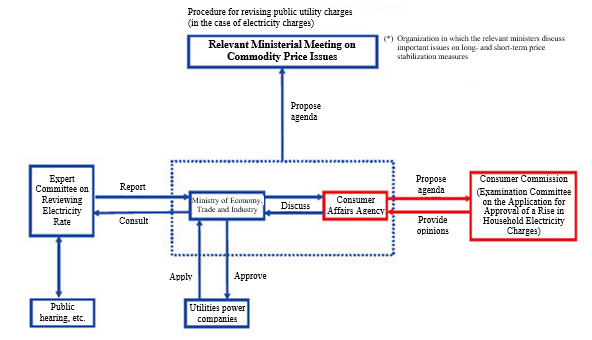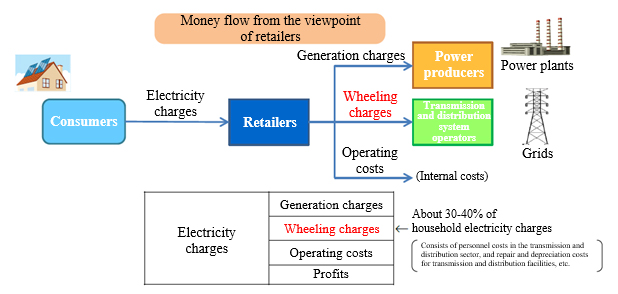Series: Considering the True Acceleration of Electricity System Reform
Vol.5: Issues of decommissioning cost and wheeling charges from the consumers’ perspective
in Japanese
Chikako Futamura, Director of Member Activities Division, Japanese Consumers' Co-operative Union
Consumer organizations have long dealt with the issues of electricity charges as “public utility charges.” When electricity charges are seen as public utility charges, any raise in these charges must be approved by the national government. It is also necessary to consult with the Consumer Commission ⅰ and hold public hearings. Several consumer representatives participate in the Consumer Commission, and representatives of consumer organizations in the relevant areas are allowed to give their opinions at the public hearing. In this way, the conventional system has ensured the involvement of consumers, whether it is sufficient or not. <Figure 1>
<Figure 1> From “Window for Public Utility Charges” on the Consumer Affairs Agency
website
http://www.caa.go.jp/information/koukyou/koukyou04.html

While electricity charges have been basically liberalized as part of the electricity system reform, “wheeling charges” have remained as public charges. However, as wheeling charges are transactions between business operators, consultations with the Consumer Commission or public hearings with the participation of consumers are not provided. On the other hand, wheeling charges constitute part of the electricity charges which are paid by consumers. Therefore, additional wheeling charges are almost synonymous with an additional burden for consumers. <Figure 2>
<Figure 2> From “Electric Utility System” on the website of the Agency for Natural Resources and Energy, Ministry of Economy, Trade and Industry
http://www.enecho.meti.go.jp/category/electricity_and_gas/electric/pdf/takuso.pdf

In this situation, an addition to the wheeling charges has been brought up for discussion. I would like to point out the problems with this discussion from three different perspectives of the consumer movement.
First of all, wheeling charges are literally intended to cover the costs related to transmission and distribution of electricity, and they should not include any other costs. Even if the decommissioning cost and other costs end up being covered by electricity charges, they should be clearly identified as generation costs, instead of wheeling charges ⅱ . Consumers have the right to know the breakdown of the electricity charges they are paying. In addition, as wheeling charges are priced under an approved monopoly, their transparency and reasonability should be fully secured. Considering that consumers do not have the opportunity to provide their opinions on wheeling charges even though they still have to pay them, these requirements for wheeling charges should be thoroughly satisfied.
Secondly, with electricity retail liberalization, consumers can now choose their power companies by themselves. We need to ensure that the consumer’s choice of a specific power company is reflected in their specific power source and generation costs. Business operators engaged in nuclear power generation should responsibly bear the decommissioning cost ⅲ , and this cost should be covered by the price of selling their electricity. Consumers will then choose between power companies after considering the difference in costs that are imposed on them. Originally, this was supposed to be the main concept of the electricity system reform. Including the decommissioning cost in wheeling charges means imposing this cost on all electricity consumers, which is unacceptable to the consumers of non-nuclear electricity.
There seems to be some confusion in this discussion, since the issue of the decommissioning and other costs involved in the accident at the Fukushima Daiichi Nuclear Power Plant is mixed up with the issue of decommissioning costs for other nuclear power plants. As for the costs related to the Fukushima Daiichi Nuclear Power Plant, I think the first thing we should do is to clarify who is responsible for the accident, calculate the costs for compensation, decontamination and decommissioning respectively, and verify the validity of the calculation. It is only after the completion of this process that we can start discussing who and how to bear these costs. As for the decommissioning costs for other nuclear power plants, it should be reasonable to simply impose those costs as part of the generation costs on the consumers of electricity from the respective nuclear power plants (by adding to the price of selling the electricity).
At any rate, I would have to totally disagree with the currently proposed system design to collect these costs through wheeling charges, both in terms of the purposes of the electricity system reform and from the viewpoint of whether it is acceptable to consumers and citizens.
ⅰ The Consumer Commission is a national organization established under the Cabinet Office as an independent third-party entity.
The Consumer Commission investigates and discusses various consumer issues, submits opinions (proposals, etc.) on general consumer policies of the relevant ministries and agencies including the Consumer Affairs Agency, and conducts investigations and deliberations in response to inquiries from the Prime Minister, other relevant ministers, and the Secretary General of the Consumer Affairs Agency.
ⅱ The idea of collecting the costs to settle the Fukushima accident in the form of a special-purpose tax contained within the electricity charges may be brought up for discussion. In that case again, these costs should not be listed as wheeling charges and should be independently listed as a tax. From this point of view, the promotion of power-resources development tax, which is included as part of the wheeling charges, has a problem because it cannot be identified by consumers.
ⅲ In this context, “decommissioning cost” means the decommissioning costs for nuclear power plants other than the Fukushima Daiichi Nuclear Power Plant which caused the accident.

